Developing High Performance Work Culture: A Leadership Perspective
VerifiedAdded on 2023/01/04
|12
|936
|35
Report
AI Summary
This report delves into the multifaceted concept of high-performance work culture, emphasizing its significance in fostering organizational success. It highlights the crucial role of leadership in establishing and maintaining such a culture, exploring various leadership styles and their impact on employee performance. The report examines coaching and mentoring techniques, including the application of emotional intelligence (EI) models like Bar-On's and Mayer, Salovey, and Car's, to enhance employee skills and abilities. It also identifies cultural barriers that can impede effective coaching and mentoring processes. Furthermore, the report presents practical coaching and mentoring techniques, such as mind mapping, force field analysis, personal quality profiles, and appreciative inquiry, to facilitate staff development and improve overall organizational productivity. The conclusion underscores the importance of high-performance work culture in achieving a competitive edge, emphasizing the role of managers in skill development, trust-building, and employee job satisfaction.
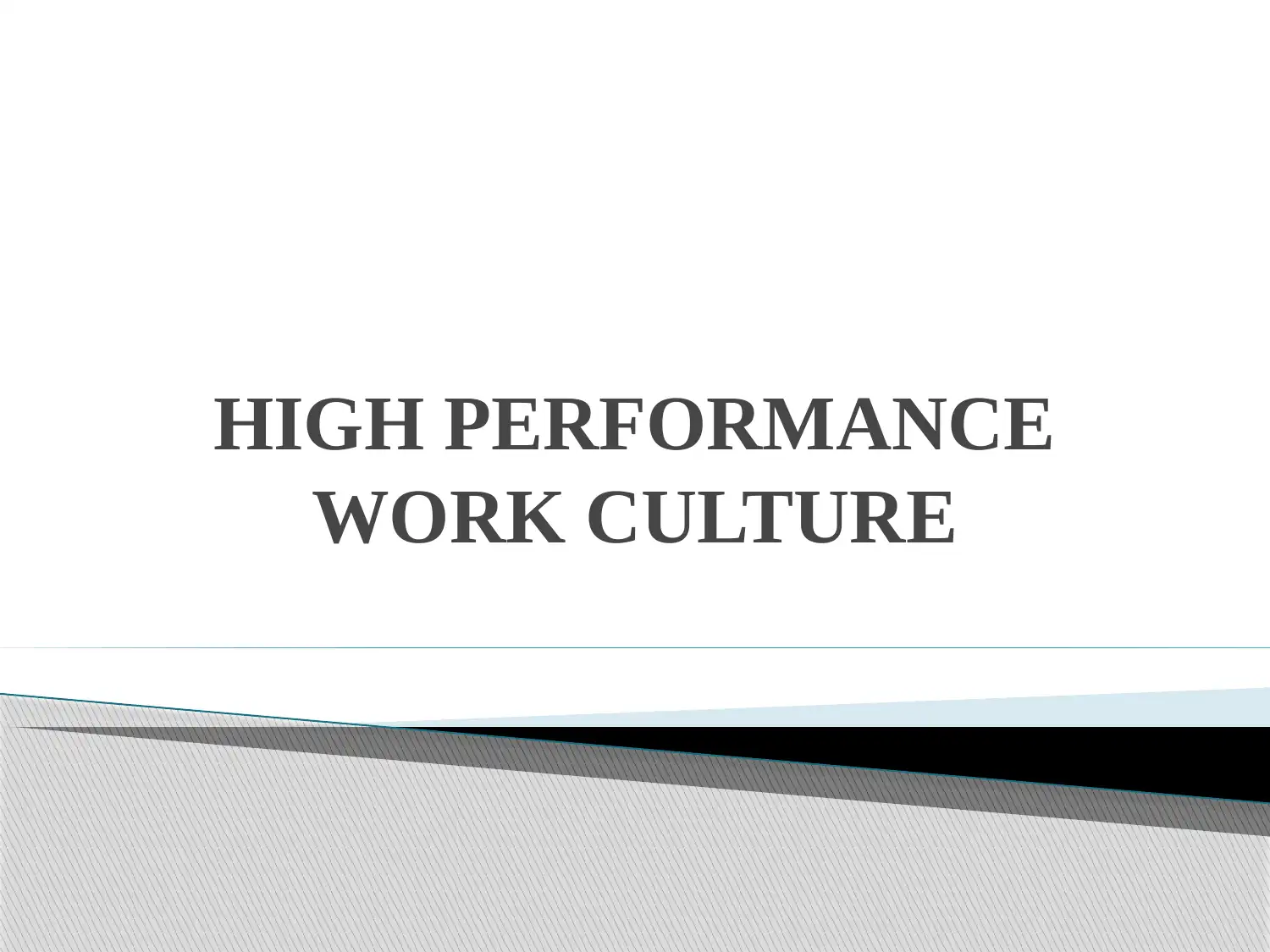
HIGH PERFORMANCE
WORK CULTURE
WORK CULTURE
Paraphrase This Document
Need a fresh take? Get an instant paraphrase of this document with our AI Paraphraser
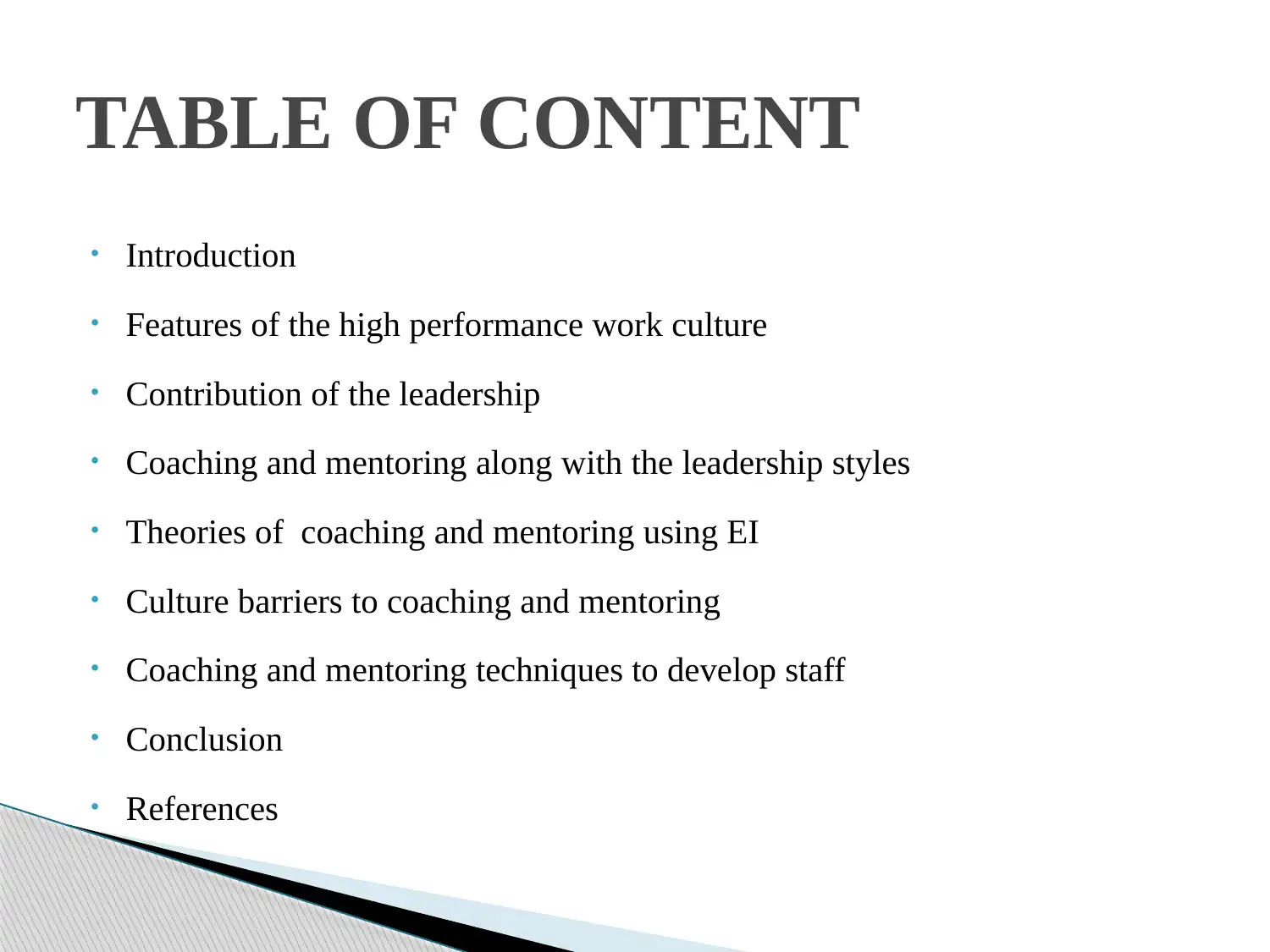
• Introduction
• Features of the high performance work culture
• Contribution of the leadership
• Coaching and mentoring along with the leadership styles
• Theories of coaching and mentoring using EI
• Culture barriers to coaching and mentoring
• Coaching and mentoring techniques to develop staff
• Conclusion
• References
TABLE OF CONTENT
• Features of the high performance work culture
• Contribution of the leadership
• Coaching and mentoring along with the leadership styles
• Theories of coaching and mentoring using EI
• Culture barriers to coaching and mentoring
• Coaching and mentoring techniques to develop staff
• Conclusion
• References
TABLE OF CONTENT
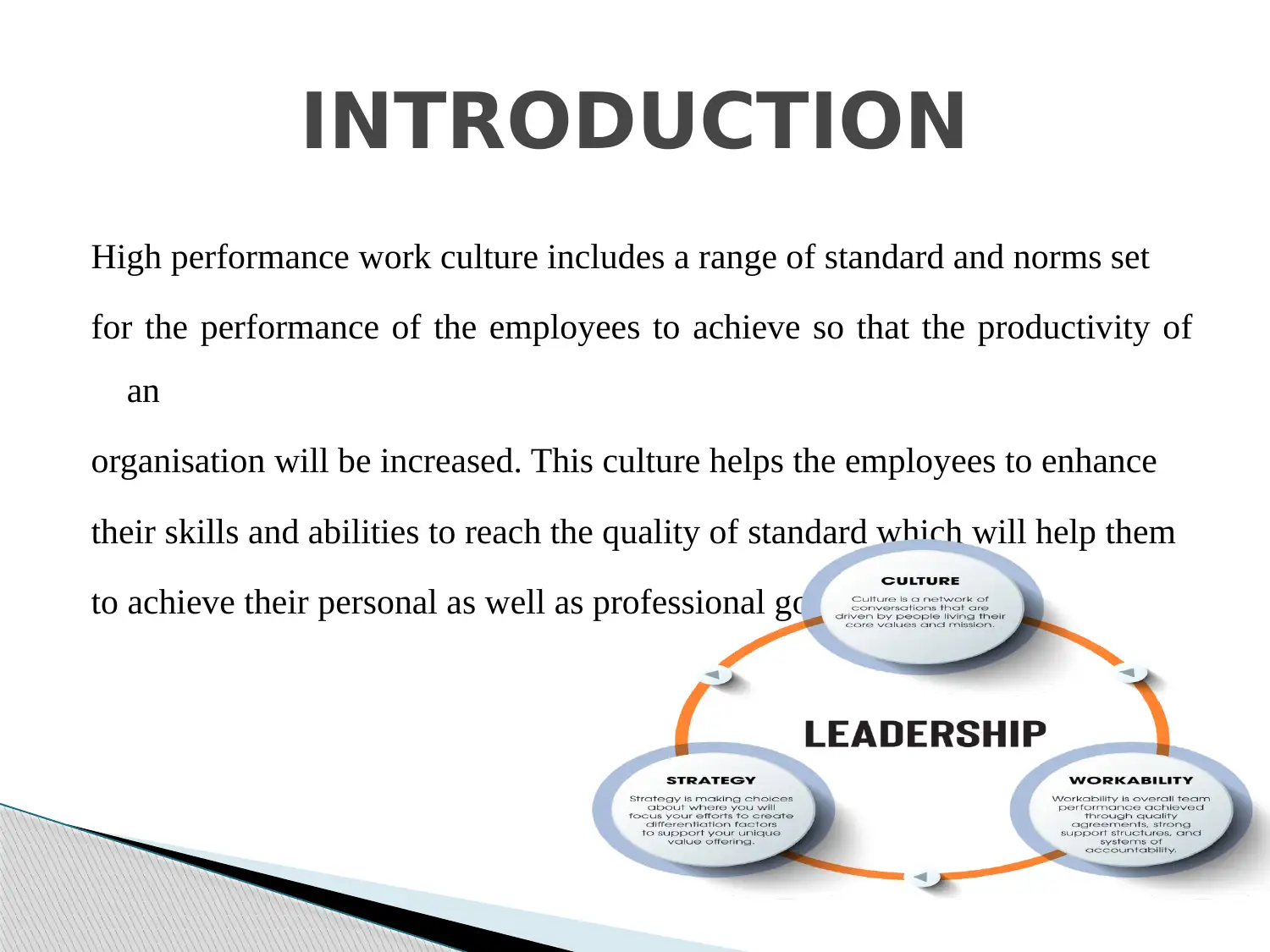
High performance work culture includes a range of standard and norms set
for the performance of the employees to achieve so that the productivity of
an
organisation will be increased. This culture helps the employees to enhance
their skills and abilities to reach the quality of standard which will help them
to achieve their personal as well as professional goals.
INTRODUCTION
for the performance of the employees to achieve so that the productivity of
an
organisation will be increased. This culture helps the employees to enhance
their skills and abilities to reach the quality of standard which will help them
to achieve their personal as well as professional goals.
INTRODUCTION
⊘ This is a preview!⊘
Do you want full access?
Subscribe today to unlock all pages.

Trusted by 1+ million students worldwide
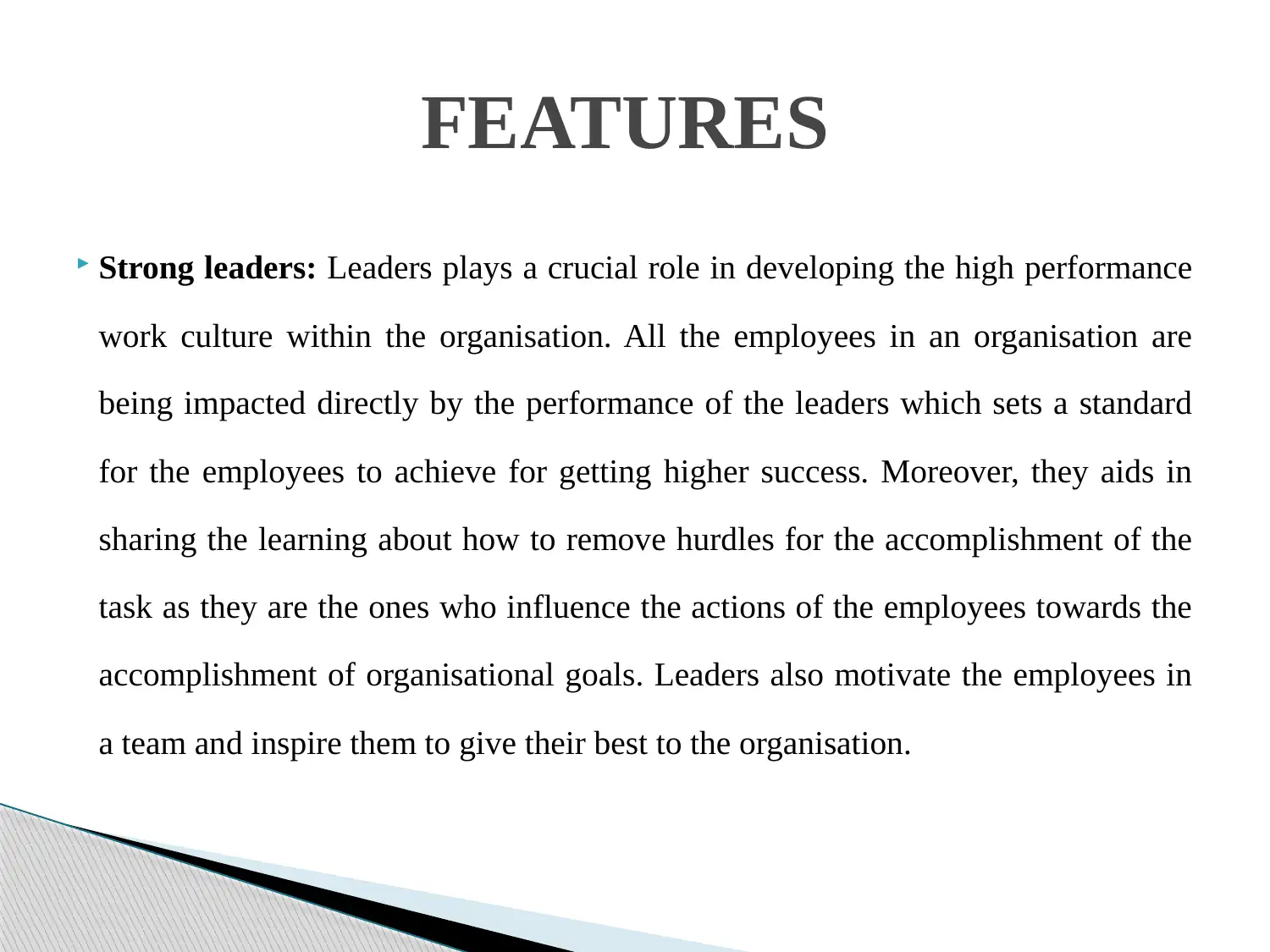
Strong leaders: Leaders plays a crucial role in developing the high performance
work culture within the organisation. All the employees in an organisation are
being impacted directly by the performance of the leaders which sets a standard
for the employees to achieve for getting higher success. Moreover, they aids in
sharing the learning about how to remove hurdles for the accomplishment of the
task as they are the ones who influence the actions of the employees towards the
accomplishment of organisational goals. Leaders also motivate the employees in
a team and inspire them to give their best to the organisation.
FEATURES
work culture within the organisation. All the employees in an organisation are
being impacted directly by the performance of the leaders which sets a standard
for the employees to achieve for getting higher success. Moreover, they aids in
sharing the learning about how to remove hurdles for the accomplishment of the
task as they are the ones who influence the actions of the employees towards the
accomplishment of organisational goals. Leaders also motivate the employees in
a team and inspire them to give their best to the organisation.
FEATURES
Paraphrase This Document
Need a fresh take? Get an instant paraphrase of this document with our AI Paraphraser
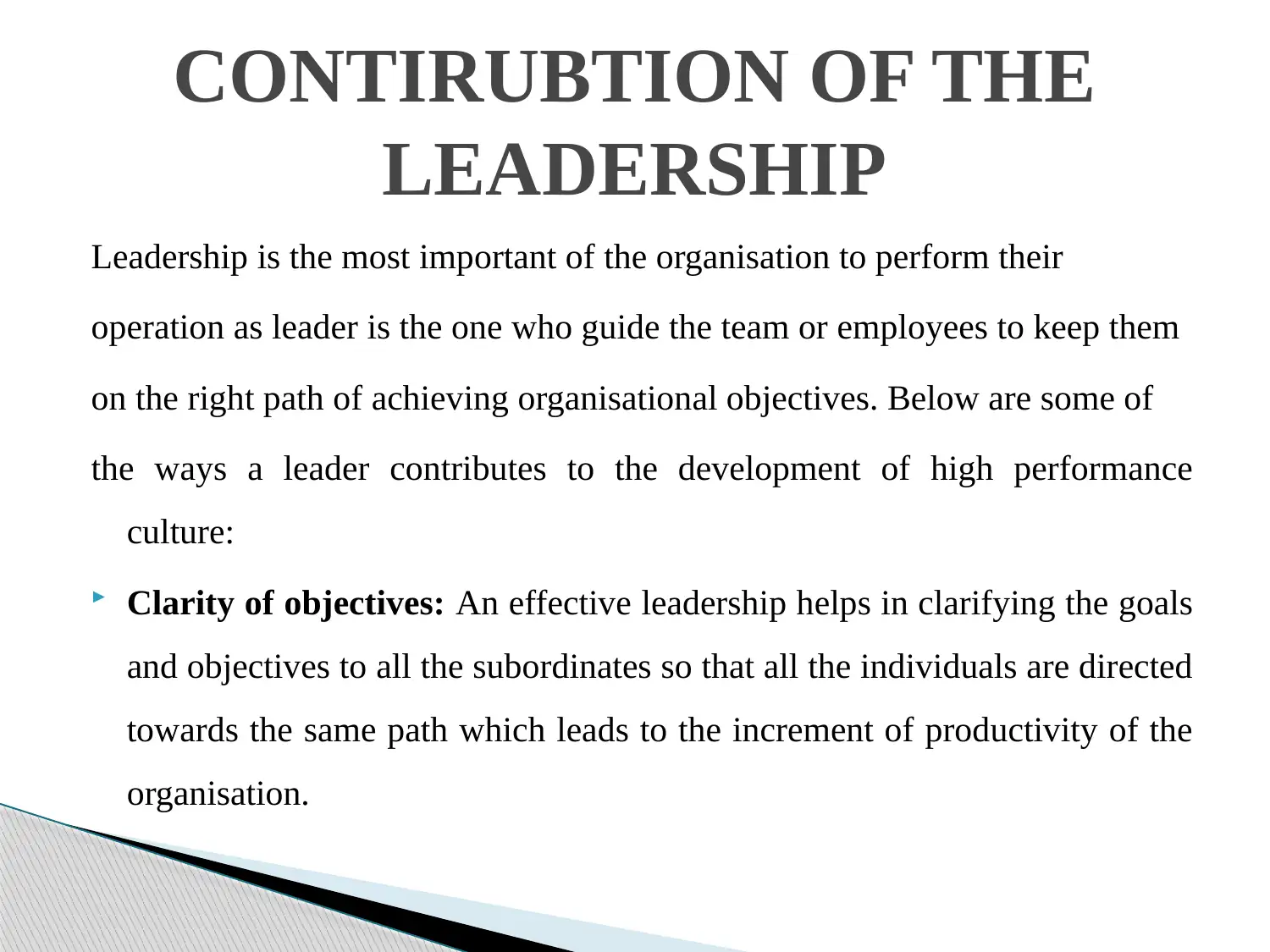
Leadership is the most important of the organisation to perform their
operation as leader is the one who guide the team or employees to keep them
on the right path of achieving organisational objectives. Below are some of
the ways a leader contributes to the development of high performance
culture:
Clarity of objectives: An effective leadership helps in clarifying the goals
and objectives to all the subordinates so that all the individuals are directed
towards the same path which leads to the increment of productivity of the
organisation.
CONTIRUBTION OF THE
LEADERSHIP
operation as leader is the one who guide the team or employees to keep them
on the right path of achieving organisational objectives. Below are some of
the ways a leader contributes to the development of high performance
culture:
Clarity of objectives: An effective leadership helps in clarifying the goals
and objectives to all the subordinates so that all the individuals are directed
towards the same path which leads to the increment of productivity of the
organisation.
CONTIRUBTION OF THE
LEADERSHIP
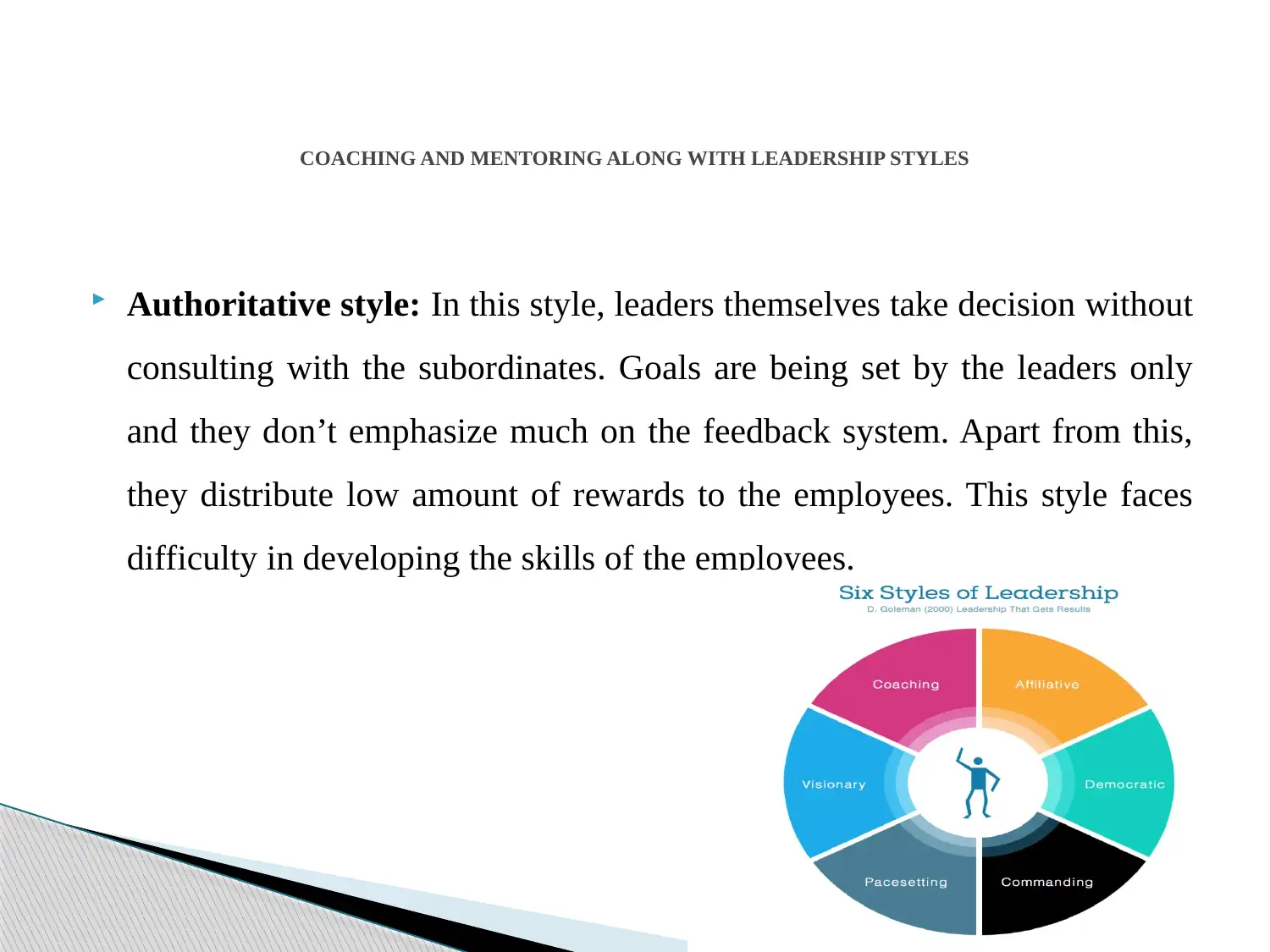
Authoritative style: In this style, leaders themselves take decision without
consulting with the subordinates. Goals are being set by the leaders only
and they don’t emphasize much on the feedback system. Apart from this,
they distribute low amount of rewards to the employees. This style faces
difficulty in developing the skills of the employees.
COACHING AND MENTORING ALONG WITH LEADERSHIP STYLES
consulting with the subordinates. Goals are being set by the leaders only
and they don’t emphasize much on the feedback system. Apart from this,
they distribute low amount of rewards to the employees. This style faces
difficulty in developing the skills of the employees.
COACHING AND MENTORING ALONG WITH LEADERSHIP STYLES
⊘ This is a preview!⊘
Do you want full access?
Subscribe today to unlock all pages.

Trusted by 1+ million students worldwide
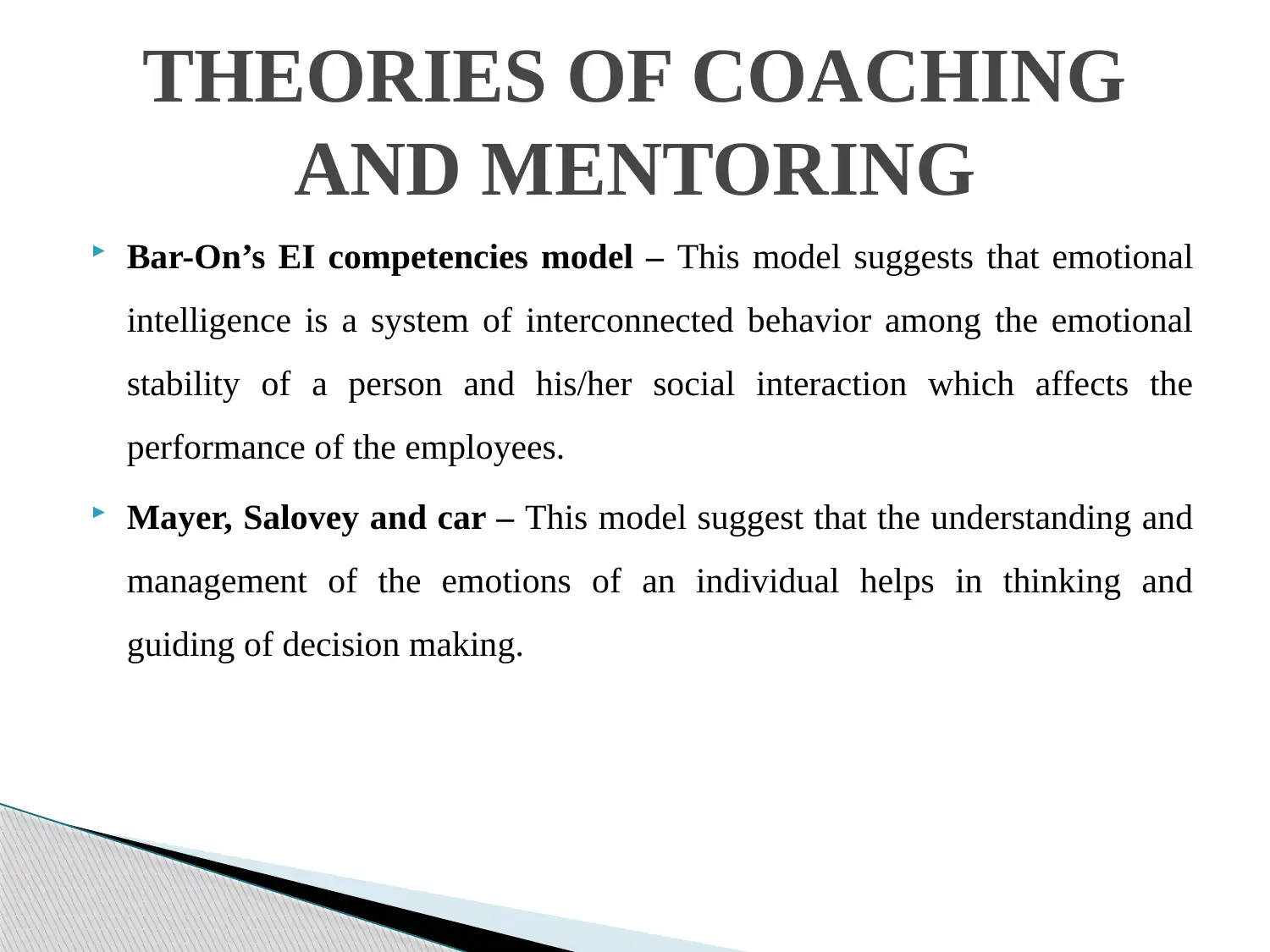
Bar-On’s EI competencies model – This model suggests that emotional
intelligence is a system of interconnected behavior among the emotional
stability of a person and his/her social interaction which affects the
performance of the employees.
Mayer, Salovey and car – This model suggest that the understanding and
management of the emotions of an individual helps in thinking and
guiding of decision making.
THEORIES OF COACHING
AND MENTORING
intelligence is a system of interconnected behavior among the emotional
stability of a person and his/her social interaction which affects the
performance of the employees.
Mayer, Salovey and car – This model suggest that the understanding and
management of the emotions of an individual helps in thinking and
guiding of decision making.
THEORIES OF COACHING
AND MENTORING
Paraphrase This Document
Need a fresh take? Get an instant paraphrase of this document with our AI Paraphraser
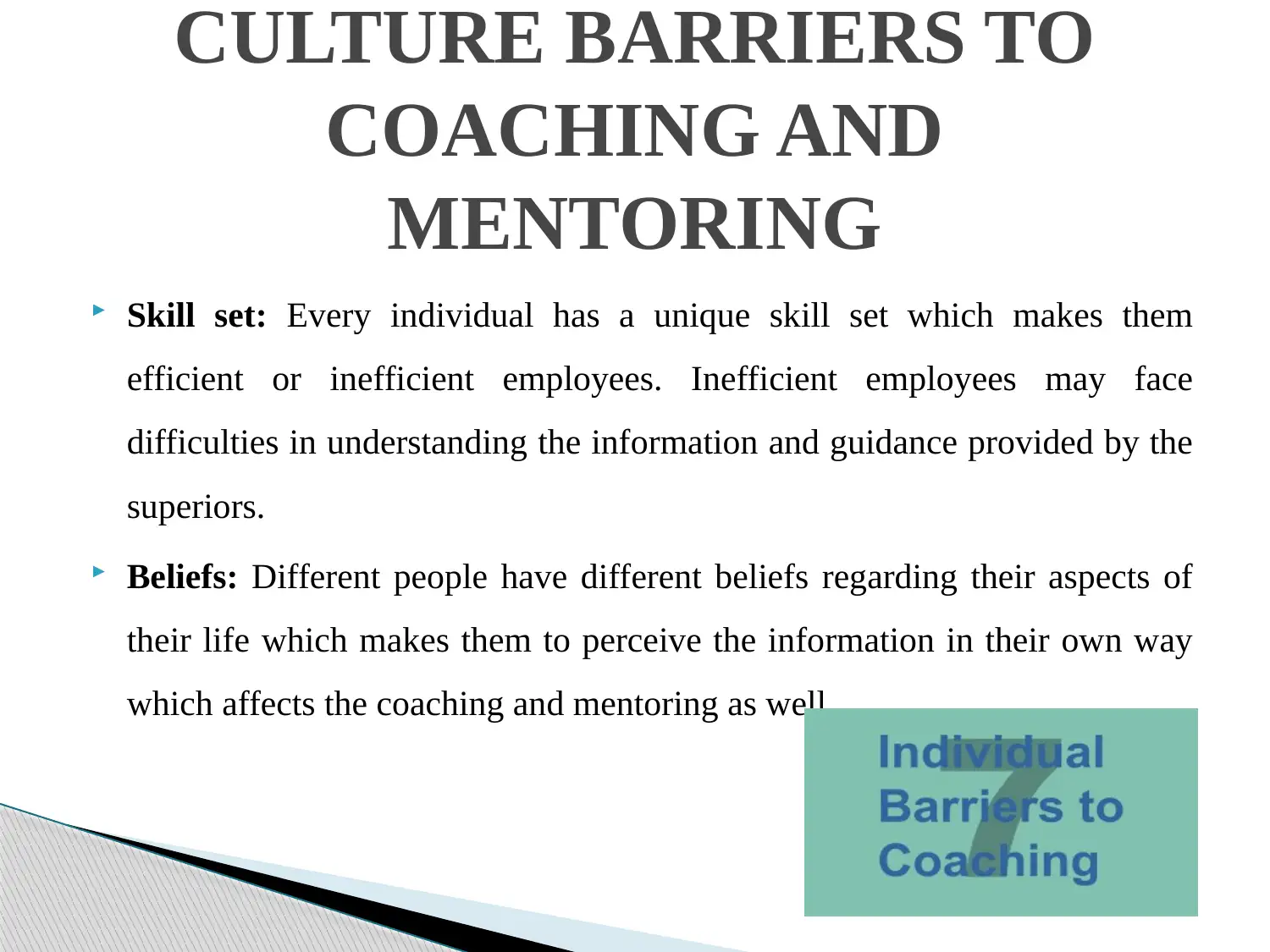
Skill set: Every individual has a unique skill set which makes them
efficient or inefficient employees. Inefficient employees may face
difficulties in understanding the information and guidance provided by the
superiors.
Beliefs: Different people have different beliefs regarding their aspects of
their life which makes them to perceive the information in their own way
which affects the coaching and mentoring as well.
CULTURE BARRIERS TO
COACHING AND
MENTORING
efficient or inefficient employees. Inefficient employees may face
difficulties in understanding the information and guidance provided by the
superiors.
Beliefs: Different people have different beliefs regarding their aspects of
their life which makes them to perceive the information in their own way
which affects the coaching and mentoring as well.
CULTURE BARRIERS TO
COACHING AND
MENTORING
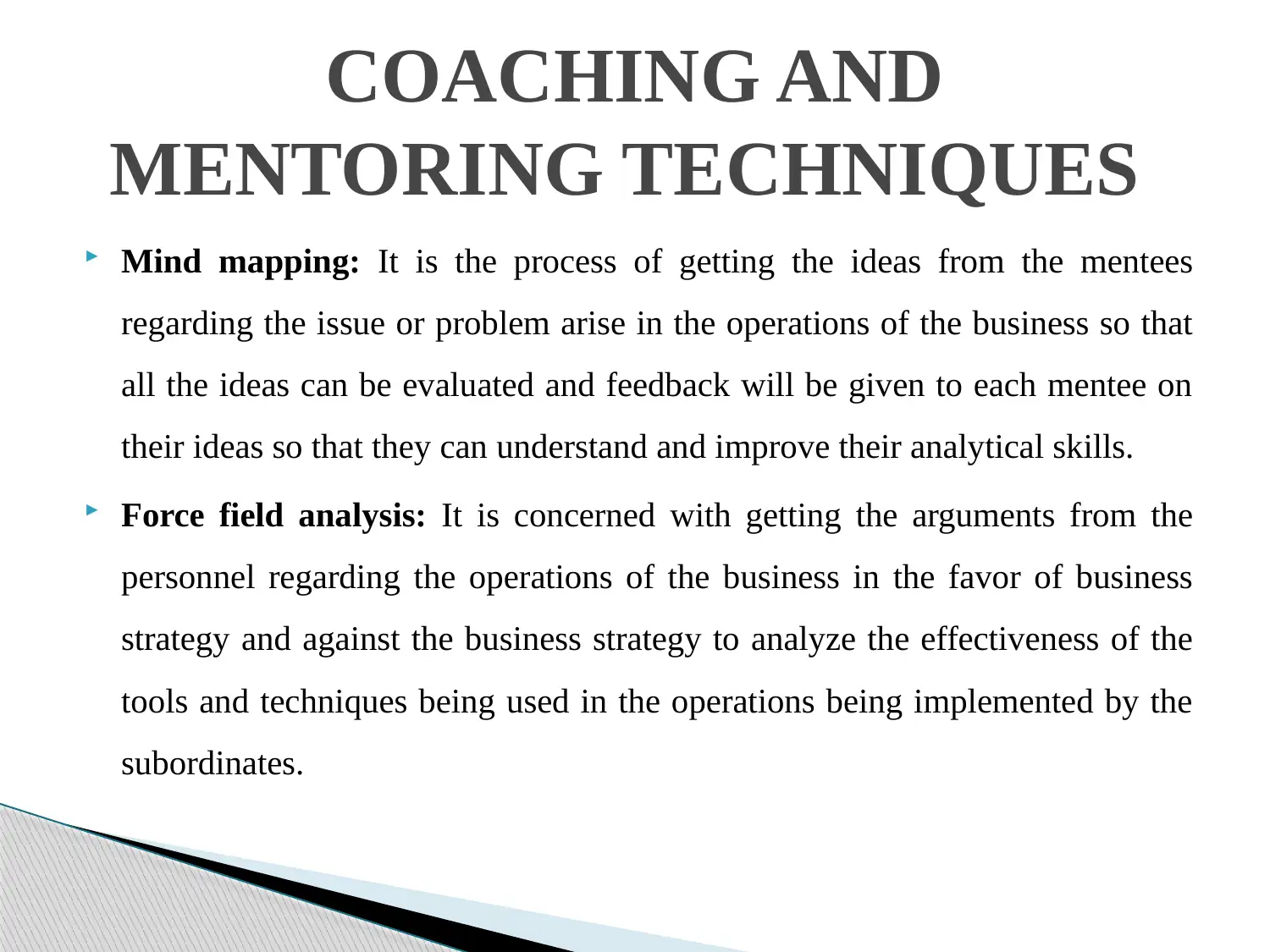
Mind mapping: It is the process of getting the ideas from the mentees
regarding the issue or problem arise in the operations of the business so that
all the ideas can be evaluated and feedback will be given to each mentee on
their ideas so that they can understand and improve their analytical skills.
Force field analysis: It is concerned with getting the arguments from the
personnel regarding the operations of the business in the favor of business
strategy and against the business strategy to analyze the effectiveness of the
tools and techniques being used in the operations being implemented by the
subordinates.
COACHING AND
MENTORING TECHNIQUES
regarding the issue or problem arise in the operations of the business so that
all the ideas can be evaluated and feedback will be given to each mentee on
their ideas so that they can understand and improve their analytical skills.
Force field analysis: It is concerned with getting the arguments from the
personnel regarding the operations of the business in the favor of business
strategy and against the business strategy to analyze the effectiveness of the
tools and techniques being used in the operations being implemented by the
subordinates.
COACHING AND
MENTORING TECHNIQUES
⊘ This is a preview!⊘
Do you want full access?
Subscribe today to unlock all pages.

Trusted by 1+ million students worldwide
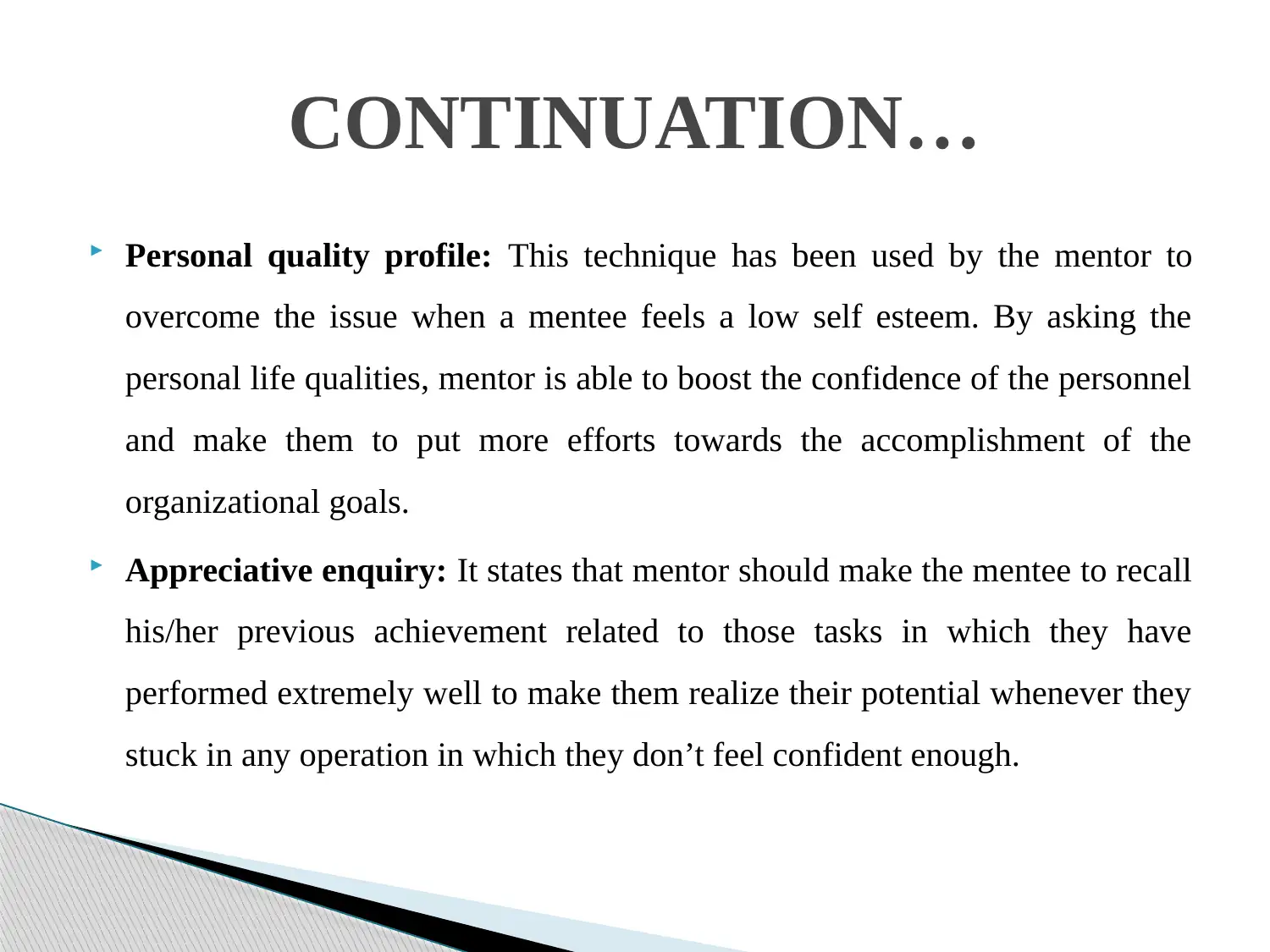
Personal quality profile: This technique has been used by the mentor to
overcome the issue when a mentee feels a low self esteem. By asking the
personal life qualities, mentor is able to boost the confidence of the personnel
and make them to put more efforts towards the accomplishment of the
organizational goals.
Appreciative enquiry: It states that mentor should make the mentee to recall
his/her previous achievement related to those tasks in which they have
performed extremely well to make them realize their potential whenever they
stuck in any operation in which they don’t feel confident enough.
CONTINUATION…
overcome the issue when a mentee feels a low self esteem. By asking the
personal life qualities, mentor is able to boost the confidence of the personnel
and make them to put more efforts towards the accomplishment of the
organizational goals.
Appreciative enquiry: It states that mentor should make the mentee to recall
his/her previous achievement related to those tasks in which they have
performed extremely well to make them realize their potential whenever they
stuck in any operation in which they don’t feel confident enough.
CONTINUATION…
Paraphrase This Document
Need a fresh take? Get an instant paraphrase of this document with our AI Paraphraser
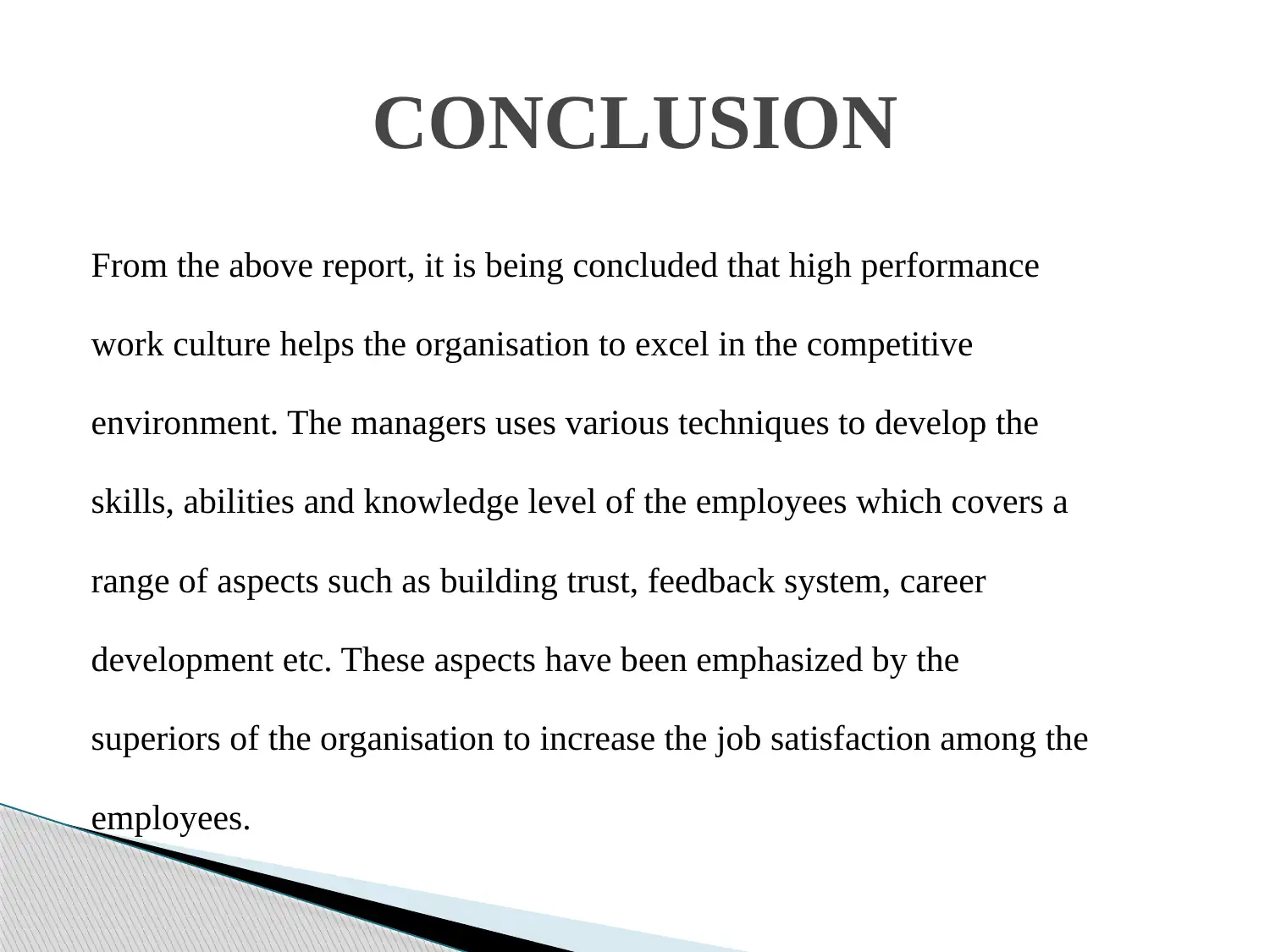
From the above report, it is being concluded that high performance
work culture helps the organisation to excel in the competitive
environment. The managers uses various techniques to develop the
skills, abilities and knowledge level of the employees which covers a
range of aspects such as building trust, feedback system, career
development etc. These aspects have been emphasized by the
superiors of the organisation to increase the job satisfaction among the
employees.
CONCLUSION
work culture helps the organisation to excel in the competitive
environment. The managers uses various techniques to develop the
skills, abilities and knowledge level of the employees which covers a
range of aspects such as building trust, feedback system, career
development etc. These aspects have been emphasized by the
superiors of the organisation to increase the job satisfaction among the
employees.
CONCLUSION
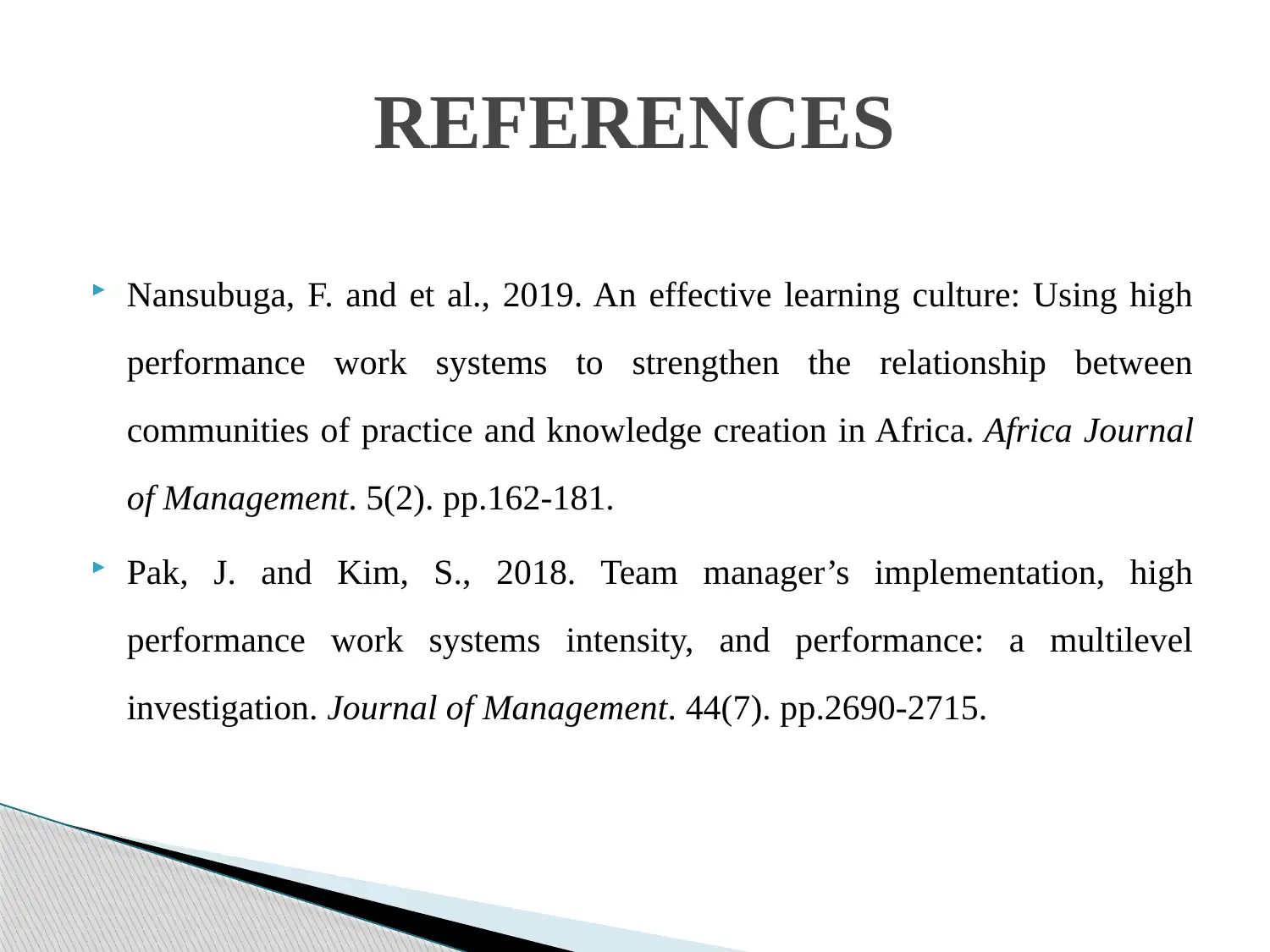
Nansubuga, F. and et al., 2019. An effective learning culture: Using high
performance work systems to strengthen the relationship between
communities of practice and knowledge creation in Africa. Africa Journal
of Management. 5(2). pp.162-181.
Pak, J. and Kim, S., 2018. Team manager’s implementation, high
performance work systems intensity, and performance: a multilevel
investigation. Journal of Management. 44(7). pp.2690-2715.
REFERENCES
performance work systems to strengthen the relationship between
communities of practice and knowledge creation in Africa. Africa Journal
of Management. 5(2). pp.162-181.
Pak, J. and Kim, S., 2018. Team manager’s implementation, high
performance work systems intensity, and performance: a multilevel
investigation. Journal of Management. 44(7). pp.2690-2715.
REFERENCES
⊘ This is a preview!⊘
Do you want full access?
Subscribe today to unlock all pages.

Trusted by 1+ million students worldwide
1 out of 12
Related Documents
Your All-in-One AI-Powered Toolkit for Academic Success.
+13062052269
info@desklib.com
Available 24*7 on WhatsApp / Email
![[object Object]](/_next/static/media/star-bottom.7253800d.svg)
Unlock your academic potential
Copyright © 2020–2026 A2Z Services. All Rights Reserved. Developed and managed by ZUCOL.





